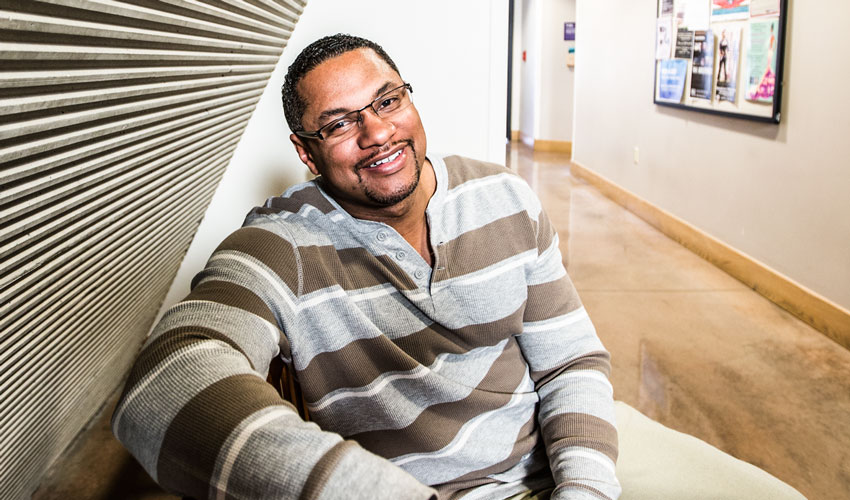SF State to lead effort to expand college access for the incarcerated

Jason Bell, director of SF State's Project Rebound program, will head up a statewide effort to expand the program to seven additional California State University campuses, making it accessible to 70 percent of individuals monitored by the California Department of Corrections and Rehabilitation.
$500,000 grant will fund Project Rebound programs at seven additional CSU campuses
San Francisco State University will lead a statewide effort to expand college access for formerly incarcerated individuals, the University announced today.
Seven California State University campuses — Bakersfield, Fresno, Fullerton, Pomona, Sacramento, San Bernardino and San Diego — will establish programs modeled after SF State's Project Rebound. Established in 1967 by the late Dr. John Irwin, a formerly incarcerated individual who became an SF State sociology professor and internationally recognized advocate for prisoners’ rights, the program helps those who have spent time in jail or prison earn college degrees, drastically reducing the likelihood they will return to incarceration.
The expansion is funded through a $500,000 "Renewing Communities" grant from The Opportunity Institute.
"Education is a powerful tool for social justice, and we see that clearly through the lives that have been transformed through the Project Rebound program," said SF State President Les Wong. "I am proud that we are leading the effort to expand this program across the state and provide more people the opportunities offered through earning their degree and becoming engaged citizens."
On June 10, SF State joined colleges and universities throughout the U.S. as well as the Obama administration in pledging to eliminate barriers to education for those with criminal records.
Supported by SF State's Associated Students and many other University departments, Project Rebound offers special admissions for men and women who may not normally qualify for acceptance. The program supports prospective students through the entire process of attending SF State. Once a student is on campus, Project Rebound provides food vouchers, BART tickets and money for books. The program also connects participants to student interns who help them navigate college. And if a participant has problems with parole or trouble receiving a state license for work such as nursing or counseling, Project Rebound is there to assist.
The data bears out the dramatic impact a college education can have on the formerly incarcerated. California has historically suffered from one of the highest recidivism rates in the nation, with up to two-thirds of those released from prison returning within a few years. But for those who participate in college programs, the odds of doing so are reduced by 51 percent, according to a RAND study on correction education. In 2010, the most recent year for which data is available, the number of Project Rebound students who returned to prison was just 3 percent.
At SF State, more than 90 percent of Project Rebound students eventually graduate, and at a faster rate than the overall student population, according to Jason Bell, the program's director. Bell spent nine years in prison and earned his bachelor's and master's degrees at SF State through the program.
"When a person leaves prison, they're often told, 'Just go out there and do the right thing,'" Bell said. "But how do you accomplish that if you don't have places to help you do what's considered the 'right thing'? Education is definitely one of those places, and Project Rebound has been a pioneer in making sure those leaving the criminal justice system have access."
According to Project Rebound data specialist and program alum Airto Morales, expanding that access is critical because many of those just released from prison cannot travel outside a specified area — and therefore cannot come to San Francisco to study — without violating their parole. Morales himself spent 10 years in prison before earning both his bachelor's and master's degrees from SF State with the help of Project Rebound.
"When you come to a university, which is a huge place, after living on a prison yard for so many years, to be able to walk into an office and know that there is someone who understands what you're going through helps a lot," Morales said.
Bell will spend the next year getting Project Rebound programs at each of the other CSU campuses off the ground, establishing program leaders at each site and setting up a pipeline of students to be enrolled the following year.
"I'm really excited, and I just want to get to work," Bell said. "I want to prove to people how important this is, to the state and to the nation."
The Renewing Communities initiative is also funding six other pilot programs. The initiative is supported by nine state and national foundations, including The California Endowment, The California Wellness Foundation, Roy & Patricia Disney Family Foundation, ECMC Foundation, the Ford Foundation, the Heising-Simons Foundation, The William and Flora Hewlett Foundation, The Andrew W. Mellon Foundation and the Rosenberg Foundation.